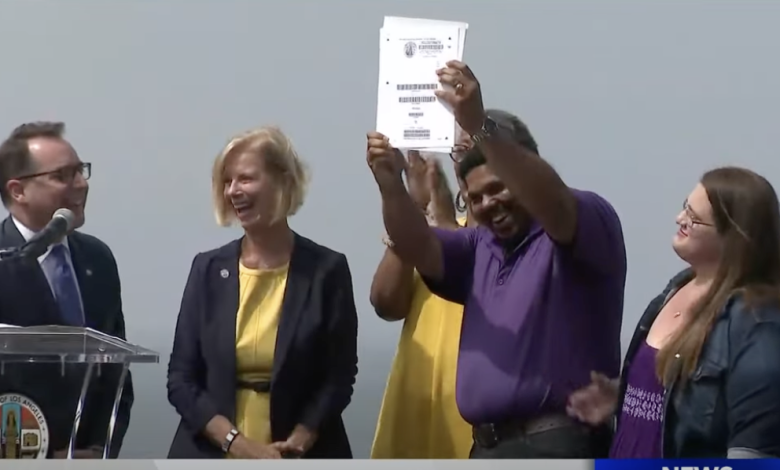Advocates ‘Disappointed’ After Family Resells Land to County for $20M

Owners of California land that was once a resort for Black Americans during segregation say they will resell the property to the county six months after regaining the 3 acres stolen from their family by the local government 98 years ago.
Those who fought for Bruce Beach to be returned to the descendants of its original owners said they are disappointed in the sale but understand the deep wound of racism, which they say lingers in the Manhattan Beach neighborhood.
“While I am disappointed the Bruces have chosen to sell the land, I understand their decision, as the city of Manhattan Beach is anti-Black,” said Kavon Ward, founder of Justice for Bruce’s Beach, in a statement. “Justice, in this case, should afford the family some peace; unfortunately, I don’t believe the Bruce family descendants will find peace taking up space in a racist Manhattan Beach.”

Marcus and Derrick Bruce’s great-grandparents purchased the land in Los Angeles County in 1912, later building a recreational mecca for Black folks with a dance hall, cafe and lodge. However, Willa and Charles Bruce were pushed out after they faced racial harassment, including an attempt by the Ku Klux Klan to burn down the resort before Manhattan Beach ultimately seized the property through eminent domain in 1924.
Eminent domain allows the government to take possession of land for public use. The city claimed it needed the land for a park and paid Willa and Charles $14,000. However, the plot of land, which the Bruces bought for about $1,200, stayed vacant after the city demolished the resort until the 1960s.
After a campaign by Ward, Gov. Gavin Newsom signed a law in September 2021 that reversed an agreement that barred the county from transferring the property, which it had acquired from the state after the city transferred the land in 1948. In July, the county handed back the deed to the family. There is currently a training facility on the grounds that the county leases from the Bruces.
George Fatheree, an attorney for the family, told the Los Angeles Times the family always intended to sell the property back to the county and it is still a victory for the Bruce descendants, who now have the money from land their great-grandparents were robbed off decades ago.
“What was stolen from the family was the property, but what the property represented was the ability to create and preserve and group and pass down generational wealth. And by allowing the family now to have certainty in selling this property to the county, taking the proceeds of that sale, and investing it in their own futures — that’s restoring some of what the family lost,” Fatheree said. “I think we all need to respect the family’s decision to know what’s in its best interest.”
Los Angeles County district supervisor Janice Hahn, who advocated for the land to be returned, said she wanted to “right” the government’s “wrong,” calling it a reparations model that she hopes other governments will follow.
“The seizure of Bruce’s Beach by Manhattan Beach nearly a century ago was an injustice inflicted upon not just Willa and Charles Bruce but generations of their descendants who almost certainly would have been millionaires,” Hahn said in a tweet Tuesday.
“This fight has always been about what is best for the family, and they feel what is best for them is selling this property and finally rebuilding the generational wealth they were denied for nearly a century,” she added.
Ward pointed out that land ownership is a crucial driver of generational wealth in America. Eminent domain and other forms of land theft have been used to stifle economic growth in Black communities throughout the country since emancipation.
“There are few ideals more American than property rights. If this nation is to live up to its purported ideals, then land reparations, restoration, and restitution are imperative,” said Tamiko Overton Parks, a spokesperson for Where Is My Land, an organization created by Ward to help other Black families reclaim their land after his success with Bruce Beach.
“The wealth is important, but it’s not just the wealth. It’s how land theft tore apart our communities, our families, deprived us of opportunity, and erased the pride of ownership and success from our history and our narratives,” Ward said in a statement.




